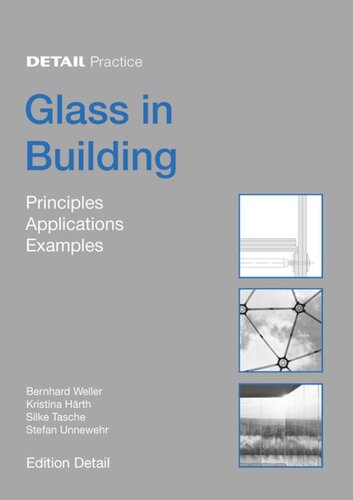

Most ebook files are in PDF format, so you can easily read them using various software such as Foxit Reader or directly on the Google Chrome browser.
Some ebook files are released by publishers in other formats such as .awz, .mobi, .epub, .fb2, etc. You may need to install specific software to read these formats on mobile/PC, such as Calibre.
Please read the tutorial at this link: https://ebookbell.com/faq
We offer FREE conversion to the popular formats you request; however, this may take some time. Therefore, right after payment, please email us, and we will try to provide the service as quickly as possible.
For some exceptional file formats or broken links (if any), please refrain from opening any disputes. Instead, email us first, and we will try to assist within a maximum of 6 hours.
EbookBell Team

4.1
40 reviewsDesigning and constructing with glass.
"Glass in Building" opens up a whole range of fascinating design possibilities for the planning architect. Glass has long served as a translucent room closing element, but its range of possible uses is actually much wider. It not only offers protection against the external world, for example, noise or fire; despite its apparent fragility, it can even take on load-bearing functions in supporting structures. In combination with various different finishing methods, materials, and coatings, it also satisfies exacting structural-physical standards. "Glass in Building" offers a clear, compact, and illustrated overview of the material-appropriate use of this varied and versatile material in building construction and provides information that goes far beyond the basics on designing with glass and producing and using specialized glass products, as well as on the building and planning regulations that must be taken into account when constructing with glass. A selection of exemplary realized projects rounds out the theoretical section.
Das Bauen mit Glas eröffnet dem planenden Architekten faszinierende gestalterische Möglichkeiten. Schon lange dient es als lichtdurchlässiger Raumabschluss, ist aber weitaus vielfältiger einsetzbar: Glas bietet nicht nur Schutz vor der Aussenwelt, etwa gegen Lärm oder Feuer, sondern kann trotz seiner vermeintlichen Zerbrechlichkeit sogar lastabtragende Funktionen innerhalb eines Tragwerks übernehmen. In Kombination mit verschiedenen Veredelungsmethoden, Materialien und Beschichtungen erfüllt es auch hohe bauphysikalische Anforderungen.
„Detail Practice: Konstruktiver Glasbau" liefert einen kompakten, anschaulichen Überblick über den materialgerechten Einsatz dieses facettenreichen Baustoffs in der Baukonstruktion und vermittelt weit über die Grundlagen hinausreichende Informationen zum Entwerfen mit Glas, zur Herstellung und Anwendung spezieller Glasprodukte sowie zu den baurechtlichen Regelungen, die im Glasbau zu berücksichtigen sind. Eine Auswahl beispielhafter realisierter Projekte rundet den theoretischen Teil ab.
Presents the most salient planning aspects and many ways of using the material
Presents constructional solutions with glass in a structural role
With international project examples